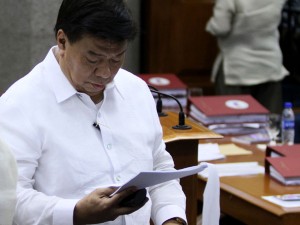MANILA, Philippines—Senate ways and means committee chair Franklin Drilon expects the chamber to approve the controversial sin tax bill on both second and third (final) readings Monday after President Aquino certified it as urgent before leaving for Cambodia.
This means the Senate would approve the contentious bill that hikes revenues from so-called sin products—tobacco and alcoholic beverages— with a little more than two weeks of debate.
Observers noted the similarly controversial reproductive health bill that lays down government endorsement and funding for artificial contraception has languished in the Senate for 15 months, awaiting the closure of debates among senators.
Drilon said Malacañang’s move to certify the sin tax bill as urgent means the Senate can do away with the required three-day interval between second and third readings of the measure.
Senators could immediately approve the bill on third and final reading on Monday right after its passage on second reading, Drilon said.
Senators earlier agreed to hold afternoon-to-evening sessions so that the sin tax bill, whose additional target revenues have supposedly been incorporated in the 2013 budget, could be approved as soon as possible.
After the sin tax bill, the Senate is expected to focus its attention on next year’s proposed P2-trillion national budget.
Drilon said President Aquino “believes the passage of this very important piece of legislation will buttress government health agenda and address the high prevalence of smoking in the country.”
Just the other day, Drilon savored the support of 12 medical health groups that expressed support for his “substitute bill” that aims to raise between P40 billion and P45 billion in additional revenues from tobacco and alcoholic beverages.
Medical practitioners called Drilon’s version a “good compromise” compared to the severely criticized committee report submitted by erstwhile ways and means chair Ralph Recto in October.
Recto’s version of the bill sought increase sin taxes by only P15 billion to P19 billion, an amount that doctors believe would not be enough to discourage people with nicotine and alcohol dependency.
Several colleagues, including Senate President Juan Ponce Enrile, Senators Miriam Defensor Santiago, Ferdinand Marcos Jr., Joker Arroyo, Sergio Osmeña III, Panfilo Lacson and Recto have already engaged Drilon in debate over the sin tax bill in the past two weeks.
“We are in the final stretch… but, certainly, without the support of the President, we would not have gone this far,” Drilon noted. “I am confident that our colleagues have seen and realized the importance of this reform measure to a great majority both as a health measure and as a finance bill. I am confident that they will vote for its passage when session resumes on Monday.”
The sin tax debates centered on finding a middle ground between the following concerns: raising enough funds for the government’s Universal Healthcare Program, discouraging smoking and at the same time providing safety nets for tobacco farmers.
The government intends to use the additional sin tax revenue to finance operations and upgrading of government hospitals and provide PhilHealth membership and benefits to 5.2 million poor Filipinos.
Enrile and Marcos, both from Northern Luzon where tobacco farming is concentrated, and Recto lauded the government’s intentions but remained vocal about their concern for tobacco farmers.
The three believe that tobacco farmers stand to bear the brunt of the resulting higher prices of tobacco products. Additional sin taxes, they allege, could also cause massive displacement of workers in tobacco processing plants.
Enrile warned that provisions of the World Trade Organization could bar the Philippines, as a signatory to the General Agreement on Tariffs and Trade of 1994, from raising taxes on imported cigarettes.
Santiago, however, insisted the Senate should go even higher than the P40 billion to P45 billion additional revenue target from sin taxes and added she preferred her version of the bill that sought to raise P60 billion in additional tax revenue.
Sen. Gregorio Honasan was the latest to air his concern for tobacco farmers in a radio interview Friday morning.
“I have nothing against the benefits of the sin tax bill but I am concerned about the thousands of tobacco farmers who will be uprooted and displaced by the taxation system. In three years’ time, the low-priced cigarettes will be taxed more than a thousand percent.” Honasan said.
He added that the new taxes would favor imported brands “while subjecting our local brands to a slow death.”
